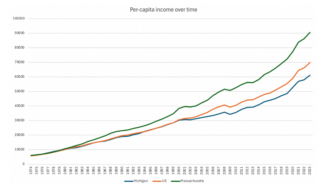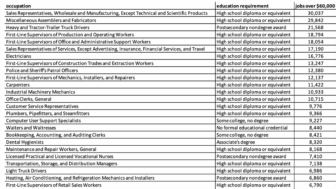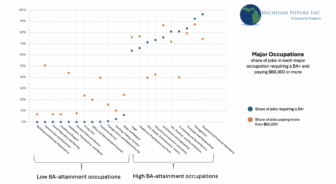![]() Another list of economic well being that you don’t want to be on that Michigan is on. This one comes from Harvard University economists Benjamin Austin, Edward Glaeser, and Lawrence Summers. They map the growth in the share of men who are not working across major regions of the United States, revealing that the share of men aged 25-54 without work has nearly tripled over the last 50 years, and that this rise is disproportionately centered in the eastern parts of the American Heartland from Mississippi to Michigan.
Another list of economic well being that you don’t want to be on that Michigan is on. This one comes from Harvard University economists Benjamin Austin, Edward Glaeser, and Lawrence Summers. They map the growth in the share of men who are not working across major regions of the United States, revealing that the share of men aged 25-54 without work has nearly tripled over the last 50 years, and that this rise is disproportionately centered in the eastern parts of the American Heartland from Mississippi to Michigan.
In a summary of the research the Brookings Institution writes: “A look at men without jobs across the country illustrates large differences in the rise of American non-employment across regions and the hardening of America’s geographic divisions. In 2016, 51 percent of 25- to 54-year-old men in Flint, Michigan were not employed. In Alexandria, Virginia, it was 5 percent.
When you look at the Brookings map of male joblessness you quickly see that this is not just a Flint problem. With among the nation’s highest male joblessness in northeastern Lower Peninsula Michigan and high rates through out much of northern Michigan.
Michigan is tied for 37th in the proportion of those 16 and older who work, in large part––but not only––because of high levels of male joblessness. By comparison if Michiganders worked at the same rate as Minnesotans (2nd) there would be 725,000 more Michiganders working today. Mississippi is 49th.
That Michigan would end up with an economy that is grouped with Mississippi is not a surprise to us. In 2011 Dave Waymire wrote a post for our blog entitled Follow the dashboard to Michissippi –– or Michesota. He wrote:
What do winner states have in common? Well, readers of this blog should have guessed by now. They are among the nation’s leaders in education attainment. They grow, retain and attract college graduates. They use brains as a magnet for knowledge industry businesses. Smart people earning good money in the knowledge industry hire plumbers, build new homes and shop in retail stores, benefiting all. And college attainment is a decent proxy for long lives.
Unfortunately, it seems that Michigan is doing all it can to ignore the policies of these states. Instead, we are focused on cutting taxes, cutting education, and becoming a so-called “economic growth” state. The problem is that those states tend to look a lot like Mississippi (dead last in per cap income for generations, shortest life expectancy, high poverty rates) than Minnesota (very low poverty rates, top 15 per cap income, one of the leaders in long lives.
Preparing, retaining and attracting college graduates will help get you the Vulcan ideal: Live long and prosper.
Low taxes will get you Michissippi.
Also in 2011 Paul Hillgonds, a Michigan Future Board member then and now, in a speech at Grand Valley State University drawn largely from our 2006 A New Agenda for a New Michigan said: “We all would like Mississippi’s taxes and Minnesota’s social and economic infrastructure, but there is no state in the nation that has both. Which fiscal strategy will we choose?”
By and large, our fiscal strategy has been to follow the Mississippi path. Austin, Glaeser and Summers document the results, as does the Michigan Association of United Way’s ALICE report that found in a strong economy 40% of Michigan households––across the state––cannot pay for basic necessities. If we want not to be Michissippi, as Hillegonds and Waymire noted seven years ago, we need to start following the Minnesota strategy.







